- Home
- Hammond Innes
Maddon's Rock
Maddon's Rock Read online
CONTENTS
COVER
ABOUT THE BOOK
ABOUT THE AUTHOR
ALSO BY HAMMOND INNES
DEDICATION
TITLE PAGE
CHAPTER I
WE SAILED FROM MURMANSK
CHAPTER II
THE EXPLOSION
CHAPTER III
ABANDON SHIP!
CHAPTER IV
THE COURT-MARTIAL
CHAPTER V
DARTMOOR PRISON
CHAPTER VI
ESCAPE FROM DARTMOOR
CHAPTER VII
MADDON’S ROCK
CHAPTER VIII
THE Trikkala
CHAPTER IX
MAROONED
CHAPTER X
DYNAMITE
COPYRIGHT
About the Book
The story of the Trikkala is a strange one.
Reported sunk in 1945, she sails into port one year later, barely afloat, her crew and valuable cargo missing. What happened during that year at sea? What secrets of betrayal and murderous greed played out on the desolate islet of Maddon’s Rock?
Proceeds from this book will be donated to ASTO (Association of Sail Training Organisations) – a charity which promotes adventure at sea for young people.
About the Author
Ralph Hammond Innes was born in Horsham, Sussex, on 15 July 1913 and educated at Cranbrook School, Kent. He left school aged eighteen, and worked successively in publishing, teaching and journalism. In 1936, in need of money in order to marry, he wrote a supernatural thriller, The Doppelganger, which was published in 1937 as part of a two-year, four book deal. In 1939 Innes moved to a different publisher, and began to write compulsively, continuing to publish throughout his service in the Royal Artillery during the Second World War.
Innes travelled widely to research his novels and always wrote from personal experience – his 1940s novels The Blue Ice and The White South were informed by time spent working on a whaling ship in the Antarctic, while The Lonely Skier came out of a post-war skiing course in the Dolomites. He was a keen and accomplished sailor, which passion inspired his 1956 bestseller The Wreck of the Mary Deare. The equally successful 1959 film adaptation of this novel enabled Innes to buy a large yacht, the Mary Deare, in which he sailed around the world for the next fifteen years, accompanied by his wife and fellow author Dorothy Lang.
Innes wrote over thirty novels, as well as several works of non-fiction and travel journalism. His thrilling stories of spies, counterfeiters, black markets and shipwreck earned him both literary acclaim and an international following, and in 1978 he was awarded a CBE. Hammond Innes died at his home in Suffolk on 10th June 1998.
OTHER NOVELS BY HAMMOND INNES
Air Bridge
Attack Alarm
Atlantic Fury
Campbell’s Kingdom
Dead and Alive
Delta Connection
Golden Soak
High Stand
Isvik
Killer Mine
Levkas Man
Medusa
North Star
Solomons Seal
Target Antarctica
The Angry Mountain
The Big Footprints
The Black Tide
The Blue Ice
The Doomed Oasis
The Land God Gave to Cain
The Last Voyage
The Lonely Skier
The Strange Land
The Strode Venturer
The Trojan Horse
The White South
The Wreck of the Mary Deare
Wreckers Must Breathe
TO
MY WIFE
You have fed me Treasure Island for years as the most exciting adventure story ever written. Well, this isn’t Treasure Island. But there is an island. And there is bullion. And it is an exciting adventure story. I hope you will like the finished book as much as you did when I outlined the story to you at Cape Cornwall.
Aldbourne.
December, 1946.
HAMMOND INNES
Maddon’s Rock
CHAPTER I
WE SAILED FROM MURMANSK
THE STORY OF the Trikkala is a strange one. She was a Greek ship, taken over by Britain in 1941, and operated by the Kelt Steamship Company on behalf of the Ministry of War Transport until 5th March, 1945. At 0236 hours on that March morning her career officially ended. A single paragraph, in a trade paper, records her end: The s.s. Trikkala, a freighter of 5,000 tons, was mined and sunk on 5th March, 1945, with the loss of twenty-three lives. She was in convoy and her position at the time of the sinking was approximately 300 miles north-west of Tromso.
Yet, on the 16th of May, 1946—just over a year later—the Naval W/T station, Loch Ewe, near Oban, picked up an SOS from a vessel describing herself as the Trikkala. Shortly afterwards this vessel radioed information that left no doubt as to her identity. It was the Trikkala. In view of the importance of her cargo, an Admiralty tug was sent out to bring her in, and for two days there was hardly a person in the country who was not speculating on the mystery of her dramatic reappearance.
I suppose I know more about the Trikkala’s story than any one still living, except perhaps Bert Cook, who was with me. I was one of the survivors of the sinking in March, 1945. And it was I who sent out the SOS from the Trikkala in May, 1946. Accordingly, I have set out here the full story as I saw it, beginning from the night before she sailed from Murmansk.
It was the 2nd of March, 1945. Bert and I were awaiting repatriation to England. Murmansk was bitterly cold. The wind ran shrieking through the great wooden shed of a warehouse in which we were billeted. It tore the cardboard packing from the broken window panes. It ripped in under the eaves and up through the cracks between the floorboards. And with it came a powdery drift of snow that sifted along the floor like sand across a desert. The vast storage floor of the shed was packed with Red Army men, vague doss-house shapes, huddled in blankets that were whitened with snow.
There were eight of us awaiting repatriation and we had been allocated a room to ourselves that had once been an office. It had a calendar and a brazier. That was all the furniture. Most of us were huddled around the brazier for warmth that night. Twenty-two days were marked off on the calendar. We had been waiting for a ship all that time. I remember thinking how in England the blackthorn would be out and there would be a smell of spring in the air. But in Murmansk the trees were black and the world was still in the grip of winter. There was ice everywhere, and a heavy blanket of snow muffled all sound, so that even the great Red Army supply wagons, with their iron-shod wheels, moved through the streets without a sound. Murmansk will always be to me a memory of intense cold, of men’s faces ruddy in the glow of a brazier and of the never-ceasing noise of the wind above the clatter and whistle of the trains and the singing of the Russian soldiers.
An extra heavy gust of wind beat against the windows. One of the cardboard panes blew out and an icy blast shivered through the room. “Cor stone the crows!” Bert Cook muttered. “’Ark at that awful wind. As if life ain’t miserable enough, but it ’as ter blow a blizzard. An’ it’s me berfday tomorrer. Nice berfday I’m goin’ ter ’ave, I don’t fink.” He looked round the bare wooden room, cluttered with kit, and then leaned closer to the brazier. He had a little monkey-like face. It was creased by laughter, and the lined, almost leathery skin was reddened by the glow of the hot coals. He had had all his teeth out just before leaving England and his cheeks had fallen in around the empty gums like the cheeks of an old crone. “S’pose the Ruskies ain’t got no glass, poor devils,” he went on. “But they might board the winders up—cardboard ain’t no good in this sort of wevver.” He got up then and fitted the bit of cardboard back into the wind
ow. He leaned a rifle against it to keep it in place. Then he came back to the fire. “Reminds me of the Free Fevvers da’n St. Pancras way, this place does. Always was a draughty pub.” He grinned at the others and spread his dirt-stained hands to the blaze.”
I liked Bert. He was the sort of man that makes four years in the ranks seem worth while. Nothing ever really got him down. He was a Cockney. His home was in Islington. But Islington or Murmansk, it didn’t worry him. I’d met up with him at a Russian Ordnance depot near Leningrad. I had been sent over to assist in the maintenance of certain predictors and Bert was there with a gunnery team, demonstrating the drill for a new gun Britain had recently sent to Russia.
Bert was gazing round the group of faces huddled close to the brazier. “Help! What a country!” he muttered. “No wonder Jerry couldn’t stick it.” His face brightened to a grin. “I got ’arf a bottle of vodka in me kitbag. I was savin’ it fer termorrer. But we’ll knock it back when we’re in the ol’ scratcher. That’ll help liven up the cockles.” And he rubbed his hands over the blaze. Then his face clouded. “But when I fink of the Ol’ Woman all alone wiv the kids in Islington,” he added, “it fair makes me blood boil. A munf’s disembarkation leave we got waitin’ fer us when we land. An’ we’re stuck in this dump. Look at that calendar! Free whole weeks we bin hincarcerated in this ware’ase—the job finished, guns all ready ter bang away at Berlin an’ a nice word o’ praise from a Rusky colonel. An’ wot do we get? Free weeks in this ’ell ’ole. Dartmoor ain’t got nuffink on this place. Got any fags left, Corp?”
I opened my case. “Gawd!” he said. “Only four left—an’ Rossian at that. Better save ’em ter smoke wiv the firewater. Where’s Mister Bloomin’ Warrant Officer ternight?”
Warrant Officer Rankin was the senior occupant of the room. He was large and fat with a smooth face and a soft voice. Blue eyes peered at you over little pouches of white flesh and his hands, which pawed eagerly at the shoulder of any subordinate who was sufficiently servile, were podgy and neatly manicured. When angry his soft voice became high-pitched. He stood very much on the dignity of his rank. And one felt that without that advantage of rank, his voice might easily deteriorate into a whine. He had been sent over to do a technical job for the Navy and was temporarily in charge of some Naval stores.
“The same place as he was last night” I told Bert in answer to his question, “and the night before and every night since we’ve been here.”
He gave an evil cackle, displaying his toothless gums. “Calls it learnin ’Roosian. That’s a joke, that is. When ’e’s in China, ’e learns Chinese, an’ when ’e’s in Sigypore, he learns whatever the native lingo is there. I bet it’s the same words ’e learns everywhere ’e goes.” The faces round the brazier cracked with laughter. They all hated Rankin’s guts. “Where’s ’e get the dough from, anyway?” Bert demanded.
“Oh,” I said, “he’s in some racket or other. Started with watches—you know how crazy the Russians are for anything that ticks. He managed to smuggle some out with him. Told me so the other night. And then he’s in charge of stores. That’s always a help to a man like Rankin. And he’s chummed up with that little political commissar who speaks English.”
“D’yer mean the fresh-faced boy wot’s s’pposed ter keep tabs on the local commandant?” Bert scowled into the fire. “I seen ’im yesterday, struttin’ alongside of ’is boss fit ter burst a ligyment. Smart as a new pin, ’e looked. A sly little chit, if you ask me. Ever bin in that place da’n on Molotov Street, Corp?”
“No,” I told him.
“Wish I ’ad as much dough as Rankin’s got,” he went on. I was only half-listening. “I s’ppose ’e’ll be drunk again ternight when ’e comes back—chuckin’ ’is weight aba’t as usual, gettin’ poor little Sills ter make ’is bed fer ’im. ’E’s a fair swine.”
And at that moment we heard Rankin’s voice in the corridor outside. It was angry and slurred. “Why the hell can’t we go aboard in the morning?” we heard him ask. And another voice replied, “Special duty. Lt.-Commander Selby insisted that you’d got to be there by 2200 hours. That’s why I had to rout you out.”
Then the door opened and Rankin stood there with a piece of paper in his hand. He wasn’t drunk. But there were two hectic spots in the smooth white of his cheeks and his eyes were bright. With him was a Naval writer from NOIC’s office—that was the office of the Naval Officer in Charge, Murmansk. Rankin leaned his bulk against the doorpost, pushed his cap on to the back of his head and said, “Who want’s to go home?” He had a sadistic little smile on his lips as he watched our faces. He knew that we were all fed to the teeth with Murmansk. He watched the rustle of expectation that ran through the faces round the brazier.
“Thinks ’e’s rafflin tickets for a passage ’ome in the Queen Mary” muttered Bert, and the others grinned.
Rankin heard the remark, but the smile didn’t leave his face. “I see you and I are going to get on well together, Cook.” Then he turned to the clerk. “What’s the time?” he asked.
“Seven-thirty,” was the reply.
“If I have ’em paraded at eight-thirty and get down to the quay about nine—that all right?”
“As long as you’re on board before ten, Mr. Rankin,” was the reply.
“Good.” Then he turned to me. “Corporal Vardy!”
“Yes?” I said.
“You’ll parade with the others detailed on this list at eight-thirty sharp, outside. And see that it’s a smart turn-out. Sills, get my kit packed and ready.” With that he handed me the paper and went out.
An eager crowd of faces peered at it over my shoulder. We read it by the light of the brazier:
The following personnel awaiting repatriation will embark on the s.s. Trikkala, No. 4 berth, Lenin Quay, not later than 2200 hours, 2nd March, 1945:
Warrant Officer L. R. Rankin, Corporal J. L. Vardy, Private P. Sills, Gunner H. B. Cook.
Dress for Army personnel: F. S. M. O. Kitbags will be carried. Warrant Officer Rankin will be in charge of the party throughout the voyage. He will report to Captain Halsey, master of the “Trikkala,” on arrival on board. He will hold himself and his party at Captain Halsey’s disposal for special duties during the voyage.
We drank Bert’s vodka then and there, and two hours later were trudging through the snow-carpeted streets towards the river and the lights of the docks. The Trikkala was not a beautiful ship. She hadn’t even the utility lines of the American liberty boat berthed astern of her. She was like an angular old spinster with her single tall funnel, high bridge and clutter of deckhousings. She had a three-inch gun perched on her high bows and another aft. Boats hung in their davits either side of the bridge and there was a third at the stern. Rafts clung precariously to their fittings above the after deckhousing. But we weren’t worrying about her looks as we climbed the gangway. We’d have cheerfully embarked in a North Sea trawler if it had been going to England.
The Trikkala was loading as we went aboard. Her holds were open and into them was being poured load after load of iron-ore. She had her derricks working and the clatter of the donkey engines and the roar of the ore pouring into the ship was deafening. Fore and aft the holds smoked like volcanoes as the ore dust billowed up into the dazzle of the loading lights. The thick mantle of snow that covered her decks was no longer white, but a dirty, reddish brown.
“Halt your men there, Corporal,” Rankin ordered. “I’ll go and see the Captain.”
We halted at the top of the gangway and stood waiting whilst the bitter wind blew choking clouds of ore dust in our faces.
Had we known then what Fate had in store for us, no military order ever devised would have sent us across that gangway on to the deck of the Trikkala. But we didn’t know. We just stood there, numbed and cold, watching without curiosity as Rankin climbed the ladder to the bridge where Captain Halsey paced to and fro. We knew nothing then of the nature of the man or of the thoughts that were racing through his mind as he walked the bridg
e of his ship.
Captain Halsey’s dead now. But he still haunts me in my dreams—a little, violent man with a black beard and black hair and black little button eyes to match, eyes that were wild and greedy and cruel. A madman full of dramatic gestures and long Shakespearean speeches that he plucked from his memory to suit his mood. A madman? But there was method in his madness. My God, yes—there was method in it. The devil himself in a peaked cap and a blue serge uniform with little gilt buttons couldn’t have plotted the damnation of a platoon of human souls with an easier conscience than Halsey planned the cold-blooded murder of a like number of human beings.
And whilst we stood on that frozen deck, the Rock was waiting for us out there in the Barents Sea. Maddon’s Rock. I shall never forget that place. Milton’s blind eyes had never seen the desolation of those seas when he described his Hell. Torrent fire, dire hail, perpetual storms and parching air, yes—but out there, lit through the eternal night by the cold, groping fingers of the Nothern Lights, is my idea of Hell; a restless tumult of waves tumbling in thunderous cascades across the reefs, climbing the cliffs of the Rock and pouring green along its flanks. And the Rock itself—living rock, as much a part of our earth as a green hill or a moss-grown bank, but here an island, thrust up out of the wrack of ocean—grey, bleak, sheened with ice and polished by the waters so that it is as smooth as the skull of a dead man.
But we knew nothing of all this as we waited for Rankin on the Trikkala’s frozen deck. In five minutes he was back with the first mate, a dour, lanky Scot named Hendrik, with restless eyes and a scar that ran from the tip of his left ear to the point of his jaw. “Come along, Corporal,” Rankin said, “and I’ll show you your quarters.” I followed them to the after-deckhousing. Just aft of the engine-room hatches on the port side was a wide steel door. The mate threw off the clips and slid it back. Then he switched on the lights to reveal a bare room about twenty feet by ten. There were no portholes and no fittings of any sort. The walls and roof were of steel and steel deck plates formed the floor. It smelt of stale grease.

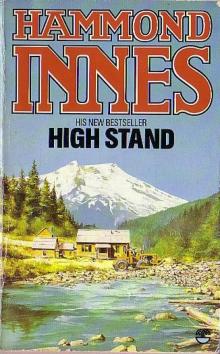 High Stand
High Stand The Doomed Oasis
The Doomed Oasis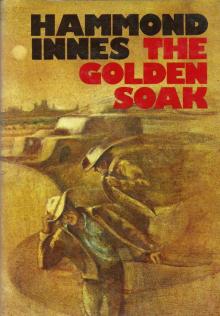 Golden Soak
Golden Soak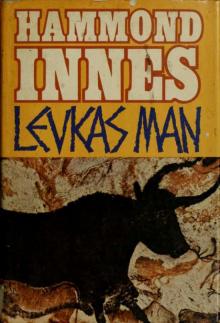 Levkas Man (Mystery)
Levkas Man (Mystery) The Strange Land
The Strange Land Dead and Alive
Dead and Alive Attack Alarm
Attack Alarm The Strode Venturer
The Strode Venturer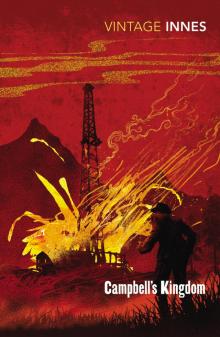 Campbell's Kingdom
Campbell's Kingdom North Star
North Star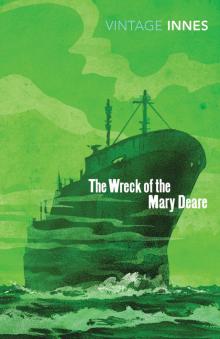 The Wreck of the Mary Deare
The Wreck of the Mary Deare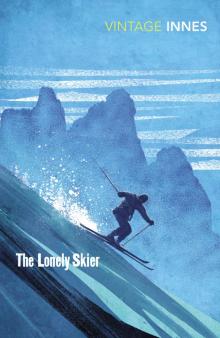 The Lonely Skier
The Lonely Skier The Black Tide
The Black Tide The Trojan Horse
The Trojan Horse Medusa
Medusa Air Bridge
Air Bridge Maddon's Rock
Maddon's Rock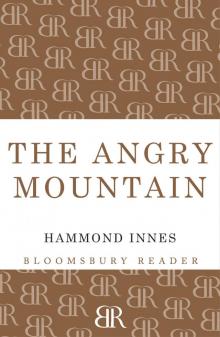 The Angry Mountain
The Angry Mountain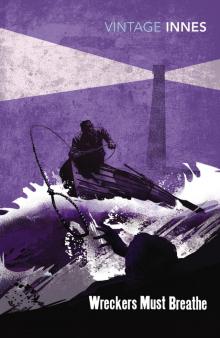 Wreckers Must Breathe
Wreckers Must Breathe Solomons Seal
Solomons Seal The White South
The White South